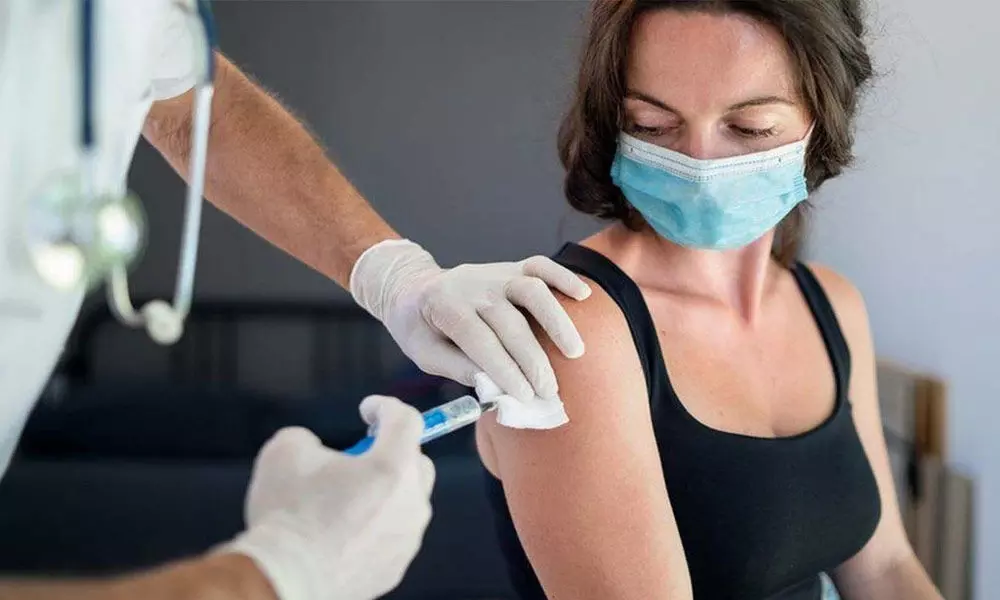Live
- US accounts for 18 per cent of Indian exports in FY24
- Will end Naxalism in Chhattisgarh by March 2026: Amit Shah
- Will gift one project daily to people during Jan Kalyan Parv
- Mahakumbh & the Politics of Sanatan Nationalism
- A Soulful Celebration of Global Music
- Brahmin Community delegation felicitates CM Saini
- Allu Arjun Visits Chiranjeevi’s House for Lunch Meet
- Toyota organising TG Grameena Mahotsav
- Special rituals conducted at Maramma Temple
- Siddaramaiah has special love for Muslims: BJP
Just In
Reasons why you should get vaccinated


Reasons why you should get vaccinated
As the COVID-19 pandemic continues to disrupt lives across the world, it is critical to vaccinate people and break the chain
As the COVID-19 pandemic continues to disrupt lives across the world, it is critical to vaccinate people and break the chain.
L Sanjay, General Physician at Apollo Spectra Hospital Kondapur Hyderabad said, "Vaccination is an imperative step in managing this pandemic, achieving herd immunity, and protecting a population from a future outbreak. Israel has now been able to relax some Covid-19 restrictions as a result of a very successful and efficient mass vaccination drive."
The following are reasons why people should get vaccinated at the earliest:
Reduced infection risk
After receiving the first dose of the vaccine, the body begins to produce antibodies that will fight coronavirus if people become infected. People may still become infected after being vaccinated, but once a majority of the population has been vaccinated, herd immunity is achieved, and the risk of infection will reduce even further. As a result, vaccination can provide community protection while also reducing virus transmission.
Protection against severe illness
Several studies have found that most COVID-19 vaccines are effective in preventing severe illness. As a result, if people get vaccinated and contract coronavirus, they are unlikely to become seriously ill. In comparison to those who are not vaccinated and become infected, people will only have mild to moderate symptoms. The population can almost eliminate your risk of hospitalization and mortality by getting fully vaccinated.
Protection of unborn or newborn babies
According to a new study, expectant mothers who were vaccinated produced antibodies that were passed on to their unborn child via the placenta. It has also been demonstrated that the antibodies pass through breast milk. This demonstrates that newborns have some immunity to the virus from the moment they are born. This is critical because young children cannot receive the vaccine and are still at risk of contracting the virus.
Reconnecting with family and friends
Those who have been vaccinated can visit their loved ones who have been vaccinated as well. After waiting for the recommended time for immunity to be built, with vaccines, people can re-establish in-person meetings that have been cut off since the pandemic began, and they can meet their loved ones. Furthermore, if people are fully vaccinated, they do not need to be quarantined if they have had contact with someone who has tested positive for COVID-19 and are not showing any symptoms.
Vaccination does not cause COVID-19
People who get vaccinated will not get COVID-19 because the vaccine does not contain a living Covid-19 virus. People may experience symptoms such as fever, fatigue, or a sore arm, but because the body is developing antibodies that will protect them from the actual virus if they become infected after being exposed to it.
Young and healthy people are also at risk
COVID-19 affects everyone, not just the elderly or the sick. Infants, children, and young adults are especially vulnerable to COVID-19 infection, which is why everyone over the age of 18 must be immunized. Both newborns and children can test positive for the coronavirus, but in most cases, the symptoms are mild or non-existent, and they recover. Serious cases, however, have occurred. Symptoms in children include fever, cough, pneumonia, sore throat, diarrhea, and extreme fatigue. It is important to get vaccinated so that the virus does not infect the young and vulnerable.
Vaccinate to protect the vulnerable
One reason to vaccinate is to protect the more vulnerable population, which includes young children, immune-compromised adults, and pregnant women. These people are relying on others to keep them from becoming infected with the virus.

© 2024 Hyderabad Media House Limited/The Hans India. All rights reserved. Powered by hocalwire.com






